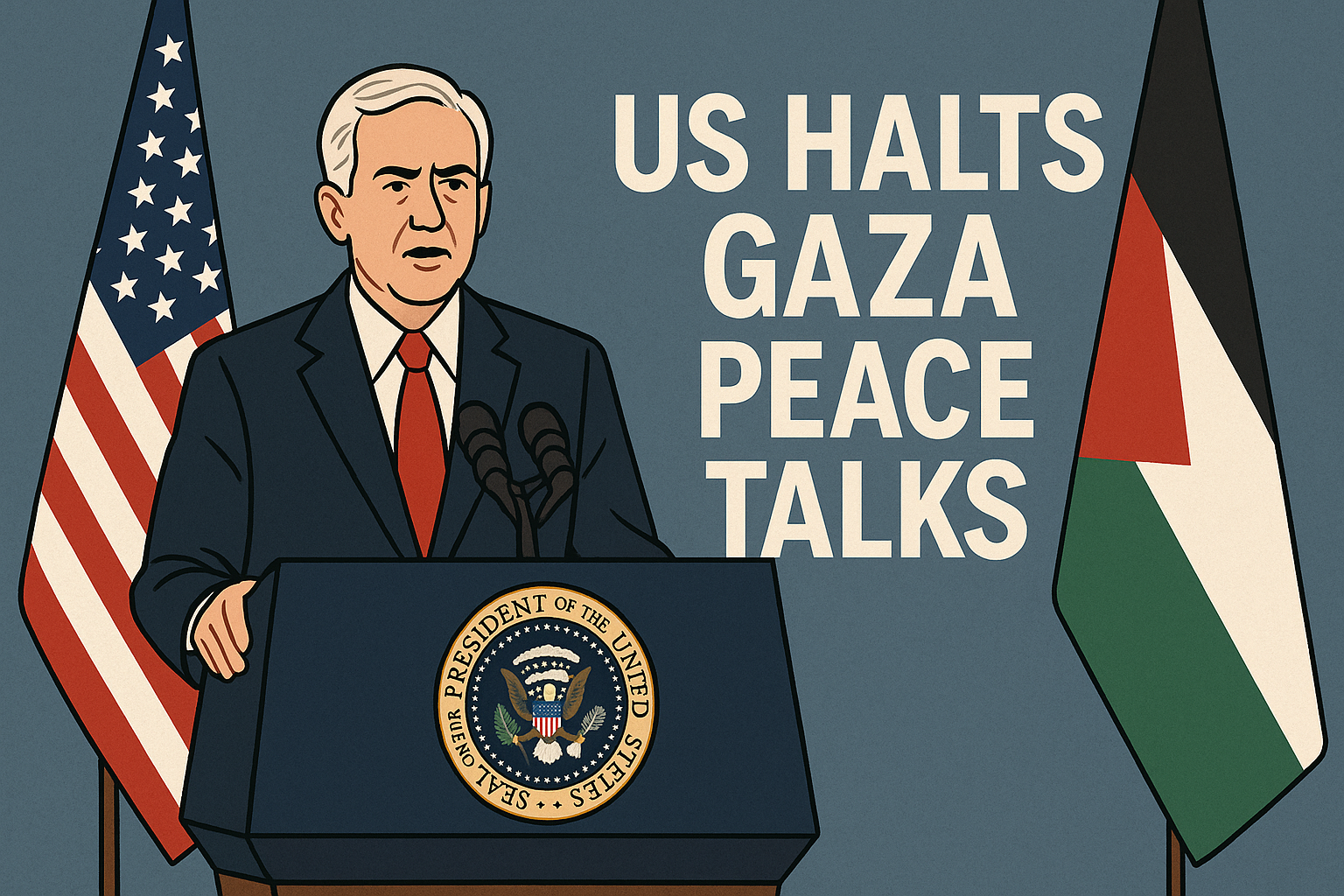US Halts Gaza Peace Talks after citing a lack of good faith from Hamas, delivering a significant setback to hopes of a ceasefire between Israel and the militant group. President Donald Trump’s special envoy, Steve Witkoff, announced the withdrawal of the American negotiating team from Qatar on Thursday, casting doubt on the near-term prospects for peace in the region.
“While the mediators have made a great effort, Hamas does not appear to be coordinated or acting in good faith,” Witkoff stated. “We will now consider alternative options to bring the hostages home and try to create a more stable environment for the people of Gaza.”
Hamas Responds with Surprise
Hamas reacted swiftly, expressing surprise at Witkoff’s “negative remarks” and insisting that the organization has shown flexibility and responsibility throughout the negotiating process. In a statement released early Friday, Hamas claimed to have offered a final answer after wide consultations with Palestinian factions, regional mediators, and involved nations. The group said it remains committed to a permanent ceasefire and constructive engagement.
Still, US Halts Gaza Peace Talks amid a political and humanitarian crisis that has stretched over 21 months of warfare. The current impasse comes despite extensive talks held in Qatar over several weeks.
The Structure of the Proposed Deal
The deal under discussion included a 60-day ceasefire in which Hamas would release 10 living hostages and the remains of 18 others in phases. In exchange, Israel would release Palestinian prisoners, ramp up humanitarian aid into Gaza, and begin indirect talks on a permanent ceasefire.
However, the negotiations faltered over fundamental disagreements. Hamas insists on a complete Israeli withdrawal and the end of the war before releasing all hostages. Israel, on the other hand, demands that Hamas relinquish power and disarm—a step Hamas is unwilling to take, although it has expressed willingness to step down from power.
US Considers Alternatives
With US Halts Gaza Peace Talks now a reality, attention turns to what alternative strategies the United States may employ. State Department spokesperson Tommy Pigott declined to provide specifics but emphasized the U.S. commitment to ending the conflict.
“This is a very dynamic situation,” Pigott said. “There’s never been a question about our resolve to reach a ceasefire.”
The decision comes just days after a meeting between Trump and Israeli Prime Minister Benjamin Netanyahu at the White House. Despite the high-profile nature of the talks and both nations’ joint military operations against Iran, no breakthrough was achieved.
Israel Also Withdraws Negotiators
In a parallel move, Netanyahu’s office confirmed that Israel was recalling its negotiating team due to Hamas’ latest response. Netanyahu’s office thanked mediators from Qatar, Egypt, and the U.S. for their efforts but provided no further details.
With US Halts Gaza Peace Talks, both parties now face increased international scrutiny. Aid groups warn that Gaza is teetering on the edge of famine, with nearly 100,000 women and children suffering from severe malnutrition. The humanitarian disaster is further complicated by difficulties in delivering aid.
Global Reaction to the Stalemate
British Prime Minister Keir Starmer announced he would hold an emergency call with French and German officials to coordinate urgent aid efforts and lay the groundwork for lasting peace. French President Emmanuel Macron declared that France would recognize Palestine as a state, underscoring the urgency of ending the war.
Canadian Prime Minister Mark Carney issued a scathing critique of Israel’s handling of the crisis, accusing the government of failing to prevent the humanitarian disaster. He called for renewed international efforts toward a two-state solution.
The ceasefire talks were originally designed to be a gateway to larger diplomatic breakthroughs. However, with US Halts Gaza Peace Talks, many fear that a return to full-scale conflict is imminent.
Conditions on the Ground in Gaza
The humanitarian conditions in Gaza continue to deteriorate. Israel has been accused of restricting aid, while the Israeli government blames the inefficiency of UN agencies. These agencies, in turn, claim that ongoing Israeli military actions make it nearly impossible to distribute aid safely. Meanwhile, more than 100 charity and human rights groups have issued an open letter calling for urgent international intervention.
A separate U.S.- and Israeli-backed aid system, operated by a U.S. contractor, has also been criticized for its chaotic implementation. Pigott defended American efforts, highlighting the Gaza Humanitarian Foundation’s role and noting that over 90 million meals have been distributed to those in need.
Trump’s Aspirations and Diplomatic Setbacks
President Trump has long expressed his desire to secure a Nobel Peace Prize by brokering high-stakes international agreements. He previously pledged to resolve the war in Ukraine and bring stability to the Middle East. However, US Halts Gaza Peace Talks marks a significant diplomatic failure, further diminishing those ambitions.
Trump had hoped to use the Gaza conflict resolution as a cornerstone of his broader Middle East strategy. Yet the current deadlock highlights the difficulty of achieving peace amid entrenched political positions and on-the-ground complexities.
A Turning Point or Temporary Pause?
As US Halts Gaza Peace Talks, experts question whether this is a temporary pause or a definitive end to the current negotiation track. The United States has not ruled out future involvement, but the path forward remains unclear.
Israel and Hamas remain far apart on key issues, and without mutual concessions, the likelihood of a renewed and enduring ceasefire remains slim.
Despite the setback, Hamas reiterated its openness to continued negotiations and expressed hope that regional and international partners would help revive the peace process.
Conclusion
US Halts Gaza Peace Talks, marking a critical juncture in the 21-month-long Israel-Hamas conflict. With hostilities escalating and humanitarian conditions worsening, the need for renewed diplomatic momentum has never been more urgent.
The international community is now tasked with stepping into the vacuum left by the U.S. withdrawal, navigating a complex landscape fraught with mistrust, political posturing, and human suffering. The future of peace in Gaza remains uncertain, but one thing is clear: the world is watching, and time is running out.
